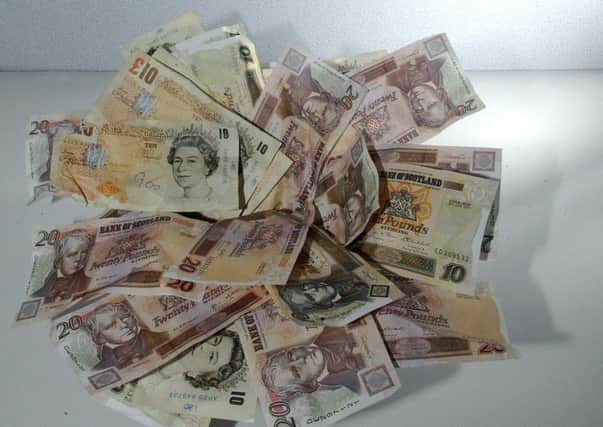Martin Lewis: Is it time you ditched cash for good?


Thomas Cook’s collapse last month was tragic for staff and worrisome for customers. In the countless interviews I did on it, I was able to reassure those without ATOL or ABTA cover who’d paid on debit or credit cards. Yet I had to tell some: “If you paid by cash, cheque or BACS, sadly you’re UNLIKELY to get any money back.”
This isn’t a militant call to ditch paper and coins. Cash can be convenient, help impulse control and budgeting, and needs supporting to help many older people who won’t or can’t change. Yet most people should now use plastic for all significant purchases.
Plus, with cards you can get paid to spend and make £100s.
Chargeback is the basic protection on most plastic
Advertisement
Hide AdAdvertisement
Hide AdWith credit, debit and most charge and prepaid cards you get chargeback protection (full info at mse.me/chargebackprotection), meaning if you don’t get what you paid for, you can complain within 120 days and ask the card provider to give your money back.
This isn’t a legal protection but it is part of the Visa, Mastercard and Amex rules. It generally applies to payments of any value – though there’s a £10 minimum with Mastercard.
I prefer credit cards though
I ensure all my spending on them as done right, ie repaid IN FULL each month so there’s no interest. Credit cards rule as:
l They’ve stronger protection. As well as chargeback protection, all UK credit cards are also protected by Section 75 of the Consumer Credit Act 1974 for items costing £100-£30,000 (full info mse.me/section75). This means the card firm is jointly liable with the retailer, and that’s powerful – for example, if you go to Brazil and bulk buy your wax, then bring it home and find it’s faulty, you don’t need to return it, you can simply ask the card firm to sort out a refund.
l Section 75 protects the whole transaction so if you pay 1p for a £10,000 car it’s all protected. Pay even a penny on a credit card, and the card firm’s liable for the entire amount – yet with a debit card, you’d only get back the amount paid on the card. One woman contacted me to thank me as she’d read my info and put a £200 deposit for a £23,000 kitchen on her credit card – the kitchen firm went bust before delivery and she got the whole amount back.
l Crucially, credit cards pay you to spend on them. Many offer rewards each time you spend on them, and it can be worthwhile, as Matthew’s tweet attests: “@MartinSLewis I usually get £140-£150 per year with my Amex Plat card (less the £25 fee), with the intro bonus I got almost £400.”
The top credit cards for rewards.
The key to using a credit card is to neuter its debt ability and turn it into a pure transaction card by paying it off in full every month, preferably by direct debit, and never using it to withdraw cash. Then do all your monthly spending on the card rather than cash or debit cards – though do stick within the credit limit and don’t see it as an excuse for additional spending.
There are a lot to choose from, and which is right for you is a personal choice. There’s a full list at mse.me/cashbackcard, but here’s a few of the top ones:
Advertisement
Hide AdAdvertisement
Hide Adl Earn 5 per cent cashback on spending. The www.americanexpress.com/uk Platinum Everyday card gives 5 per cent cashback on all spending in the first 3 months (max £100), then up to 1 per cent after (22.9% rep APR if you don’t fully repay). You’ll need to spend £3,000+/yr on it to get any cashback. Though remember Amex isn’t accepted in quite as many places as Visa and Mastercard.
l Free £25 at M&S for buying a banana. New bank.marksandspencer.com cardholders get 2,000 bonus M&S points worth £20 if you spend anything on the card in the first 90 days – plus there’s a 500 bonus point voucher for M&S spending, so buy a banana in M&S and you’ve made £25 (19.9 per cent rep APR if you don’t fully repay).
l Earn 0.5 per cent cashback with overseas spending. As well as paying cashback on all spending, the www.tandem.co.uk credit card is a specialist cheap overseas card – so it doesn’t add the usual 3 per cent-ish exchange rate fee and you’ll get the same near-perfect exchange rate the banks do when you spend on it overseas (18.9 per cent rep APR if you don’t fully repay). It’s beatable for cashback and spending abroad individually, but it wins as a one-card spending solution. The Aqua Reward card (www.aquacard.co.uk) is similar but has a higher APR.
What about people who don’t trust themselves?
While these are the strengths of credit cards if done right, done wrong they can be a dangerous temptation (though while credit cards are often seen as debt cards, of course debit cards are debt cards too for those who are overdrawn).
So if you have impulse control issues or don’t trust yourself, don’t risk switching to a credit card – getting yourself into a steaming pile of unneeded debt is a bigger risk than a lack of protection and missing out on cashback.
Martin Lewis is the Founder and Chair of MoneySavingExpert.com. To join the 13 million people who get his free Money Tips weekly email, go to www.moneysavingexpert.com/latesttip